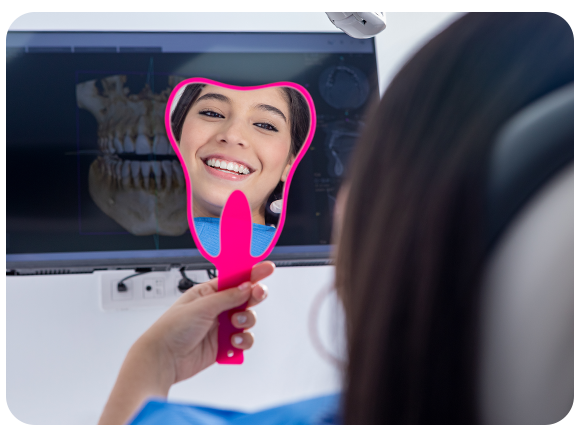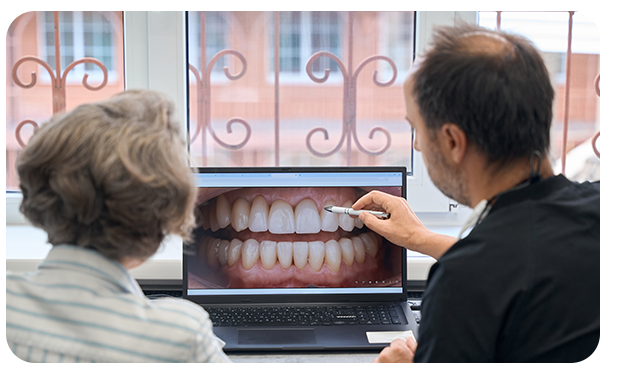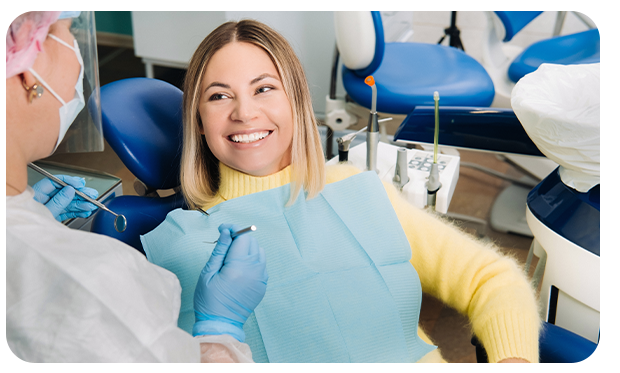Digital Smile Design
A beautiful smile significantly affects both self-confidence and social interaction. However, achieving a natural, harmonious smile requires more than just technical dental procedures—it demands a personalized approach. With Digital Smile Design (DSD), patients now have the opportunity to preview and co-design their new smile before any treatment begins. At LHC Clinic, we bring aesthetics and technology together to help you achieve the smile of your dreams with precision and confidence.
What is Digital Smile Design, how is it applied, and what are its benefits? We’ve prepared all the details of this cutting-edge aesthetic dentistry approach for you.
What Is Digital Smile Design (DSD)?
Digital Smile Design is an advanced treatment planning system that uses digital tools and software to analyze facial and dental structures. It allows dentists and patients to co-create a customized, natural-looking smile plan before starting the actual procedure. DSD goes beyond just the teeth — it evaluates the smile in harmony with your lips, gums, facial expressions, and overall proportions.🎯 Key Features of DSD
💡 Beyond the Teeth


Who Is Suitable for Digital Smile Design?
Digital Smile Design is ideal for individuals who value both aesthetics and precision in dental treatments, including: Your dentist at LHC Clinic will assess your needs and aesthetic goals during a comprehensive consultation and determine whether DSD is the right solution for you.
How Is Digital Smile Design Applied?
The DSD process is both visual and interactive, ensuring a personalized approach from start to finish. It includes the following steps:


Advantages of Digital Smile Design
Digital Smile Design offers a unique combination of art and science, providing patients with unmatched benefits: DSD empowers you to be part of the design process, ensuring a smile that feels both beautiful and authentically you.
Post-Treatment Care Tips Digital Smile Design
Once your new smile is achieved, maintaining it with proper care is essential: 📌 Your dentist will provide a tailored aftercare plan based on your specific treatments to help maintain your smile's beauty and function for years to come.


✅ Smile with Confidence through Digital Smile Design
Digital Smile Design is more than a treatment—it’s a journey to discovering your best smile. 📍 At LHC Clinic, we offer cutting-edge technology and personalized expertise with Digital Smile Design to help you achieve the smile you deserve. 📍 Contact us to schedule your Digital Smile Design consultation and take the first step toward a naturally beautiful smile. 📍 For a confident, aesthetic, and digitally perfected smile, we welcome you to LHC Clinic!
Frequently Asked Questions
Laminate veneers may not be suitable for individuals with: • Severe tooth misalignment or bite issues • Insufficient enamel • Habitual teeth grinding (unless managed with a night guard) • Active gum disease A thorough dental examination is necessary to determine veneer suitability.
Gum recession occurs when the gums pull away from the teeth, exposing roots and causing sensitivity. Treatment Options: • Deep cleaning (scaling and root planning) • Gum graft surgery in severe cases • Use of desensitizing toothpaste to manage symptoms Early treatment helps preserve gum health and prevent tooth loss.
Bruxism involves involuntary grinding or clenching of teeth, often during sleep. Possible causes: • Stress and anxiety • Misaligned teeth • Sleep disorders Treatment: • Night guards to protect teeth • Stress management strategies • Orthodontic treatments if misalignment is a factor
Early gum disease (gingivitis) is often painless but presents signs such as:
• Red, swollen, or tender gums
• Bleeding when brushing or flossing
• Chronic bad breath
• Receding gums or tooth sensitivityRecognizing these early warnings can prevent progression to more serious conditions like
periodontitis, which may lead to tooth loss.
Facts:
• Frequent sugar intake feeds bacteria in the mouth, producing acids that erode enamel
• Even natural sugars can contribute to decay if oral hygiene is poor
Myths:
• Only candy causes cavities—actually, starchy foods and sweetened drinks can be just
as harmful
• Brushing right after eating sweets prevents cavities—it's better to wait 30 minutes to
avoid brushing softened enamel
